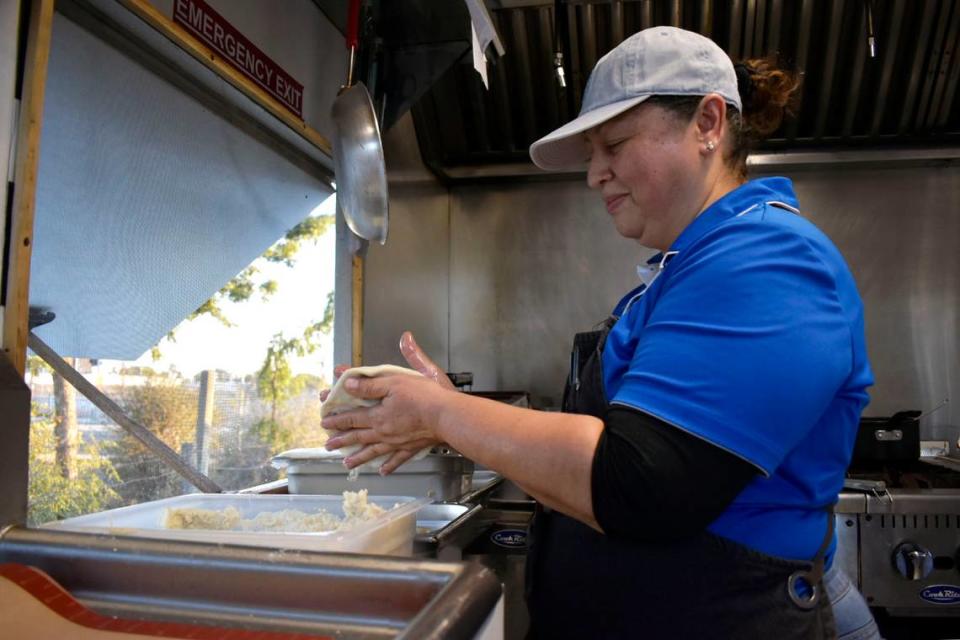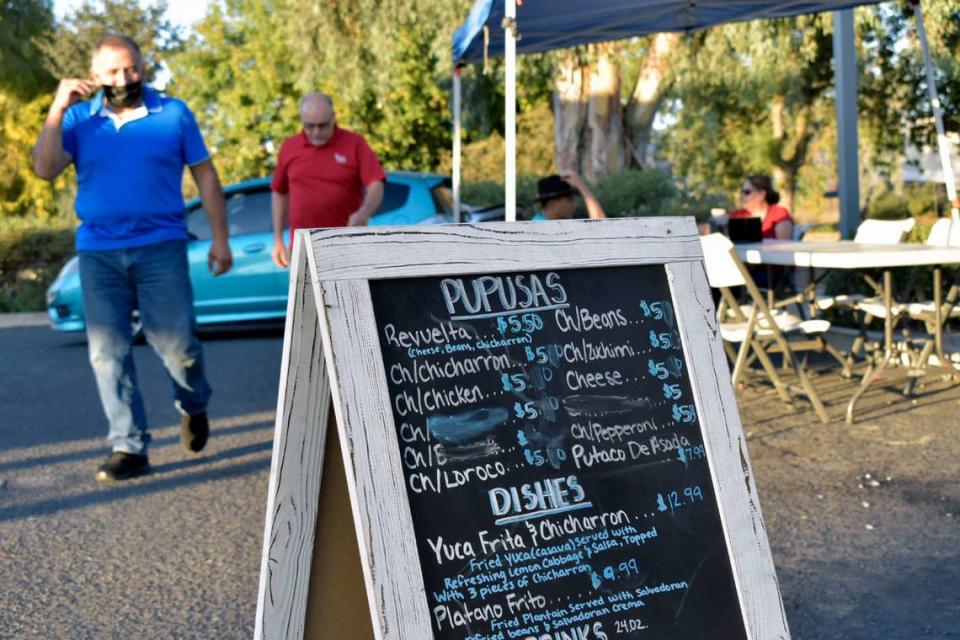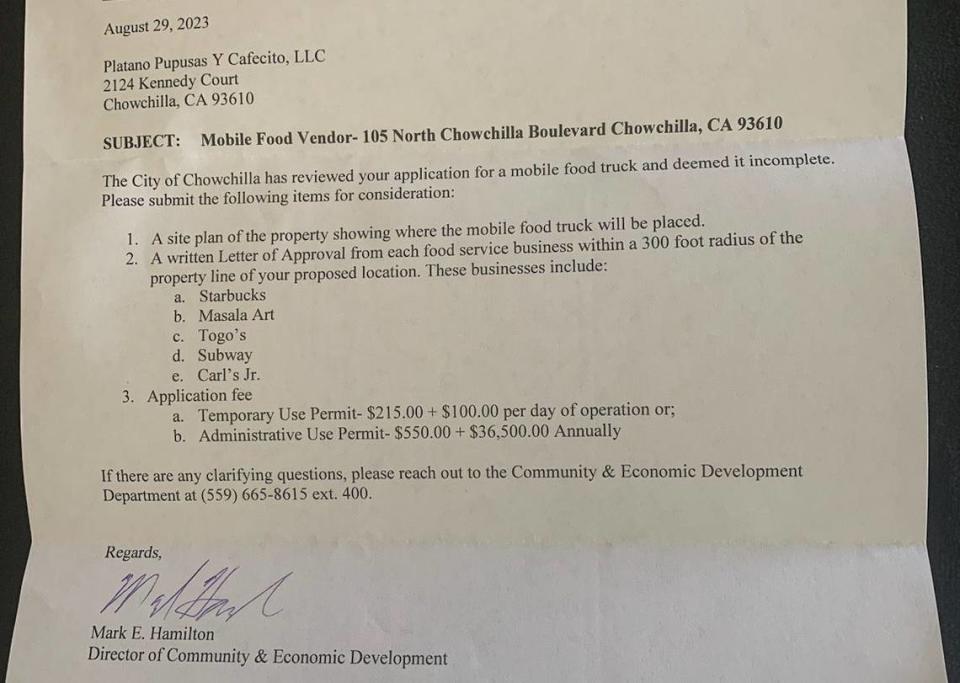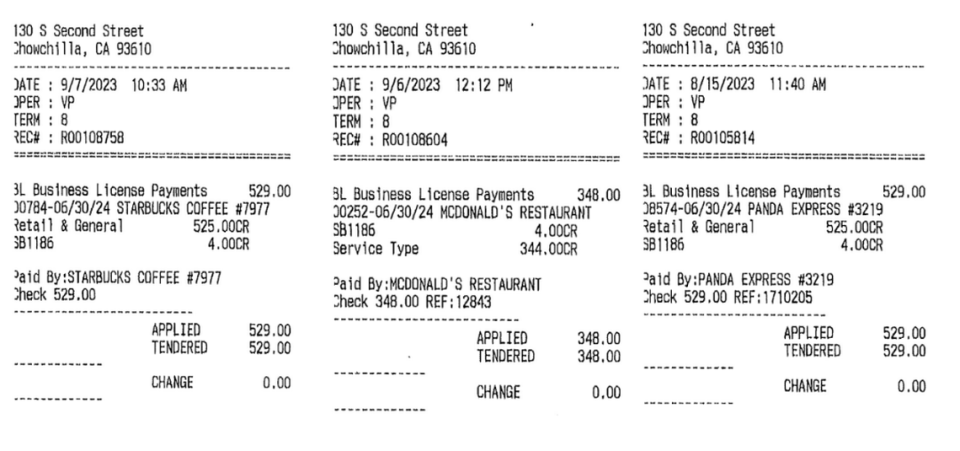California city wants to charge food trucks $100 a day. Owners say fee has ‘racial undertones’
Digna and Adonay Díaz have lived in Chowchilla for more than 20 years. Like many other Latino immigrants, they fled violence in their homeland in search of a better life. Like many of those who land in the Central Valley, the Salvadoran-born married couple, both in their 50s, worked in the fields when they arrived.
They’ve opened multiple businesses in Chowchilla since then, and also wanted to operate their food trailer, Plátano, Pupusas Y Cafecito, in the city.
But to operate their truck in Chowchilla would cost so much in new government fees, perhaps $100 a day, it might not be worth it. So they moved the operation and the dream to Madera, where there is no $100 per day of operation fee for food trucks, and where they don’t feel policy unfairly targets Latino businesses.
The situation began in August when the Chowchilla City Council passed several fee updates in an attempt to make the city’s costs “more current to today’s standards,” said Community and Economic Development Director Mark Hamilton.
La Abeja, a newsletter written for and by California Latinos
Sign up here to receive our weekly newsletter centered around Latino issues in California.
For Catalina López Mendoza, owner of Tacos El Guerrero, the price of a permit in Chowchilla could jump from $242 to $36,500 a year.
The Díaz’s son, Josue Díaz, who works as an accountant in Fresno, said the new food truck fee feels very targeted toward an industry dominated by Latinos.
To Chowchilla Mayor Ray Barragan Jr., the situation amounts to a misunderstanding, and it is one that can change.
“Come to council,” he said. “Make changes.”
Operating in Chowchilla ’very difficult,’ food truck owners say
Adonay Díaz said seeking a food truck permit in Chowchilla felt like trying to get a construction project approved.
To meet the city’s food truck requirements, they had to find a location more than 100 feet from residential zones and 300 feet from existing restaurants, unless every existing restaurant provided written permission.
Mendoza, who operates Tacos El Guerrero next to a tire shop on Chowchilla’s west side despite the lot being adjacent to an apartment complex, said she’s had similar struggles.
“It’s been very difficult,” she said in Spanish. “At one point, I was about to say, ‘You know what, we will just not be able to do it here.’”
In addition to the citys’ operating cost, Mendoza said she pays the tire shop $1,000 per month for rent, and that it’s her “only option.” She initially wanted to operate in the lot of a Shell gas station on the city’s east side.
Large chain restaurants have denied Mendoza and the Díaz family permission at different locations, they said. The Díaz family thought it was close to settling in the same Shell station lot Mendoza had looked at when they received a city letter dated Aug. 29 — one week after the new fees were passed.

That’s how they found out about the new costs: A $215 temporary use permit plus $100 per day of operation, or a $550 administrative use permit plus $36,500 annually.
“I thought it was some sort of mistake,” Digna Díaz said.
The Díaz family opened Plátano, Pupusas Y Cafecito in the city of Madera at a cost of $614 per year. Hamilton told The Bee that the comparisons to Fresno and Madera are inadequate, as Chowchilla’s population is much smaller.
Dos Palos charges food trucks $200 per day, he mentioned. Madera County, Hamilton added, charges them $120 per day. The county’s Community and Economic Development Department confirmed in an email Tuesday that no $120 per day of operation fee exists for food trucks.
“That’s what we were told,” Hamilton told the Bee.
The county’s Community and Economic Development department had not responded to the Bee’s request for clarification as of Tuesday.
The city of Kerman in Fresno County has a population much closer in size to Chowchilla’s. It allows six permanent food trucks and charges them around $800 per year.
An email between Josue Díaz and Hamilton shows the city intends to bring Tacos El Guerrero into compliance with the new fee.
“No, I will not be able to afford that,” Mendoza said.
Public records provided to The Bee by Josue Díaz show Mendoza paid $242 when she renewed her food truck’s license in July, before the new fee was approved.
Those records also show Panda Express and Starbucks paid $529. Hamilton confirmed that those establishments are not subjected to a daily fee like the one for food trucks.
Discrimination against Latino businesses?
That Tacos El Guerrero operates outside of the city’s food truck requirements may not matter because it sits in a lot on the west side of town, Josue Díaz said.
It’s the more neglected, Latino side of town, he added, where not all neighborhoods have sidewalks.
While it’s not explicit, Josue Díaz continued, it seems to his family that the new food truck fees may have a racial undertone because the business type is one that Latinos often look to for entrepreneurship. Mendoza said her difficulties with operating in the city have led her to feel the same way.
“With this new fee ... they’re essentially kicking Latino businesses out of the city,” Josue Díaz said.

Having owned businesses before, the licensing process wasn’t new to Digna Díaz. But she said she had a difficult time.
Hamilton told The Bee that the city has a record of helping many other types of small businesses, including minority-owned brick-and-mortar restaurants like Lady G’s Soul Spot and Taquería Las Aves.
“We have a blend of restaurant owners,” Hamilton said. “We help out everyone.”
In the past, local businesses expressed that food trucks would be a problem for them, Chowchilla Mayor Ray Barragan Jr. said.
“Mark (Hamilton) is just doing what prior councils requested,” he said.
Juan Espinoza, an attorney with the Los Angeles-based law firm Public Counsel, said pressure on local governments to place extreme regulations on micro-businesses is not uncommon. Espinoza has worked to support street vendors and other micro-entrepreneurs in California for two years.
“There’s a misconception that (micro-businesses) don’t pay the same operational costs as brick-and-mortar businesses,” Espinoza said. “That rhetoric is related to anti-immigrant sentiment.”
Barragan, reiterating that the city’s anti-food truck stance is a result of past requests, said social media comments that he doesn’t want Latino businesses in town and that he doesn’t want food trucks in town are untrue.
“I’m Hispanic, so I’m not prejudiced against anybody,” he said. “I want every Hispanic business in the world to open in Chowchilla.”
The Díaz family believes Barragan should have abstained from voting on the new food truck fee because he owns Sugar Ray’s BBQ on Robertson Boulevard. The mayor said that doesn’t mean he has an interest in keeping food trucks out, as he only opened the restaurant to add jobs to the community.
Also untrue, Barragan said, is the idea that Chowchilla is in any way anti-business. He mentioned the $150 million AutoZone distribution center under construction in the city as a food truck opportunity.
“Everything is up for a change,” he said. “As the city grows, things change with that.”
Chowchilla leaders herald new $150M AutoZone distribution center, will create 300 jobs
Chowchilla wants food truck owners to come to City Council
There was minimal discussion among the council when it passed the new fees in August. Barragan attributed this to the city having so few food trucks in the past decade.
“If we had people that say they want a food truck in town, we’d listen to them also,” he said.
He and Hamilton both said the Díaz family has not completed a permit or fee waiver application. The council decides whether a fee waiver is granted to an applicant.
“Go talk to council and say, ‘Hey, is there any way I could possibly park my food truck here and have a different fee schedule,’” Barragan said. “We would consider that.”
Until a fee waiver application is submitted, there is no way to know whether it will be approved, Hamilton said.
Josue Díaz said the city’s process for approving fee waivers gives the council too much power: The decisions are arbitrary.
“It opens the door to favoritism,” Espinoza agreed. “The council’s discretion can create disparities.”
Even if they do not bring their business back to Chowchilla, the Díaz family said its goal is to have the $100 per day fee repealed and the process for licensing a food truck made easier.



